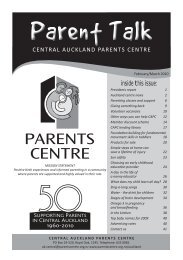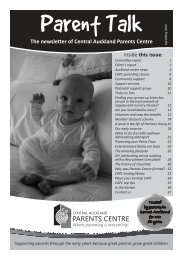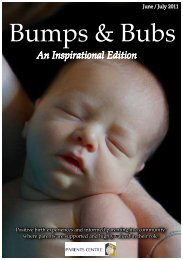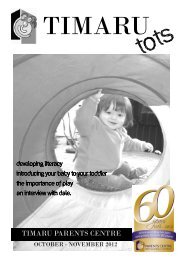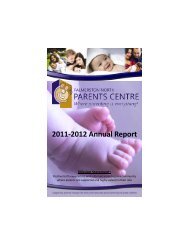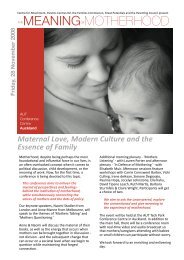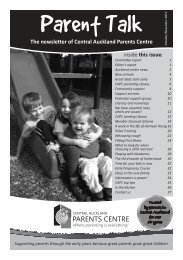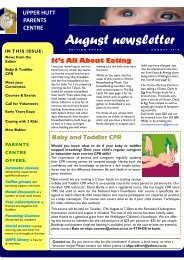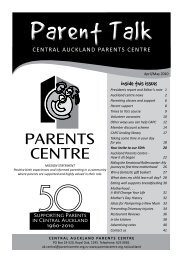Newsletter Aug-Sept 2012 - Parents Centres New Zealand Inc
Newsletter Aug-Sept 2012 - Parents Centres New Zealand Inc
Newsletter Aug-Sept 2012 - Parents Centres New Zealand Inc
Create successful ePaper yourself
Turn your PDF publications into a flip-book with our unique Google optimized e-Paper software.
What are my options when<br />
parental leave ends?<br />
Notice of return If you are intending to return to<br />
work following your parental leave, you are required<br />
to write to your employer 21 days before<br />
your leave ends and advise them of your intention<br />
to return to work.<br />
If your employer was not able to keep your job open<br />
while you were on parental leave, you should instead<br />
tell the employer 21 days in advance the date<br />
you will be available for work. This date becomes<br />
the start of your six-month “preference” period.<br />
Not going back to work If you decide that you will<br />
not be returning to work when your parental leave<br />
ends, you must write to your employer and tell<br />
them this at least 21 days before your leave ends.<br />
If you decide not to return to work during the period<br />
you are receiving the parental leave payment, your<br />
payment ceases when your employment ceases.<br />
If you do not go back to work at the end of your parental<br />
leave, your employment will be considered<br />
to have ended on the day you started the leave, but<br />
you are not required to repay the parental leave<br />
payment.<br />
Early return to work You can return to work early,<br />
or start your preference period early, if your child<br />
is miscarried, is stillborn, dies, or is adopted or<br />
cared for by someone else. You should write to<br />
your employer 21 days before the date you intend<br />
to return. You may also return to work early if<br />
your employer agrees. The employer may ask for a<br />
medical certificate if you wish to return early from<br />
maternity leave.<br />
What other assistance is available? Working families<br />
that have children may be entitled to the parental<br />
tax credit or paid parental leave. <strong>New</strong> parents<br />
may access one, but not both, of these entitlements.<br />
The parental tax credit is a family assistance payment<br />
administered by Inland Revenue. The number<br />
of children in a family and the family’s level of income<br />
are used to calculate whether the family is entitled<br />
to the payment, and the level of the payment.<br />
In most cases, families will receive a higher level of<br />
payment if they apply for paid parental leave. However,<br />
parental tax credit payments may be higher<br />
where a family:<br />
• is on a low income<br />
• is expecting the birth of, or intends to adopt,<br />
more than one child<br />
• wishes to take only a short period of parental<br />
leave.<br />
You can only access one of the payments, and you<br />
need to decide which is the best for you. Inland<br />
Revenue can provide you with advice on whether<br />
paid parental leave or the parental tax credit would<br />
be best for you. www.ird.govt.nz or by phoning IRD<br />
on 0800 227 773.<br />
Becoming a stay at home Dad<br />
In one study published in Psychology of Women<br />
Quarterly in 2005, researchers from Yale University<br />
looked at the attitudes of our culture at large<br />
towards traditional and non-traditional families.<br />
The researchers defined traditional as a family<br />
with a working father and stay-at-home mother,<br />
and non-traditional families as families with a<br />
working mother and a stay-at-home father. The<br />
results of these studies were quite interesting,<br />
and they just go to show what some of the common<br />
reactions to stay-at-home dads are.<br />
The researchers in this study found that people<br />
liked traditional families more, and that<br />
they expressed negative attitudes – usually very<br />
openly! – towards non-traditional families. Stay-athome<br />
dads were somehow viewed as less-than by<br />
other people, and working mothers were not wellrespected<br />
or well-liked unless they were working<br />
because of financial necessity rather than for personal<br />
fulfillment.<br />
If you’re already a stay-at-home dad or have talked<br />
with people about the possibility of becoming one,<br />
this all probably seems like a no-brainer to you!<br />
It’s not at all uncommon for people to have a distinctly<br />
negative, know-it-all attitude towards stayat-home<br />
dads. But then, of course, there’s the op-<br />
28<br />
CENTRAL AUCKLAND PARENTS CENTRE



